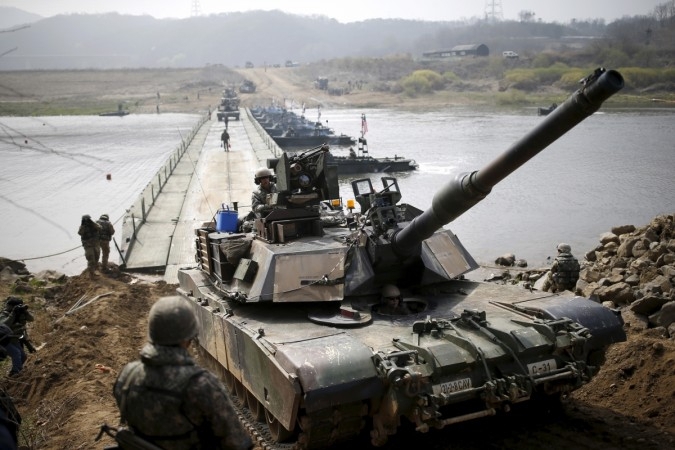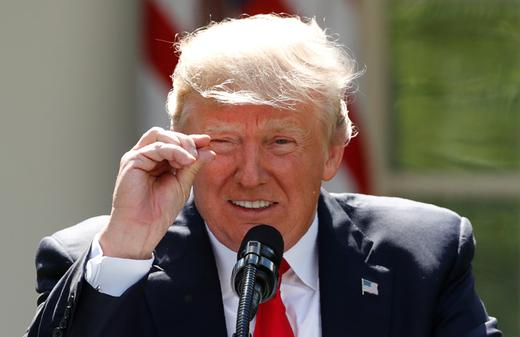
The ongoing conflict between the US and South Korea over the cost of the American troops stationed in the peninsula worsened this week after Washington categorically demanded a 500 percent hike in Seoul's share. US President Donald Trump has never been a vocal supporter of the deal under which the American taxpayers underwire the huge military deployment in South Korea.
Now the question is if Trump will eventually convince the US stakeholders that it's alright to pull the US troops from South Korea. Some political observers think Trump has been preparing the pitch for the eventual pullout by raising the cost factor and demanding more money.
How many US troops are there in South Korea and why are they there?
There are approximately 28,500 US troops in South Korea. The American troops are deployed there as a counterweight to the aggressive military posturing of North Korea. The South and North Korea are officially at war as the Koran war was technically halted on an armistice. The countries have not achieved lasting peace and North Korea' Kim Jong-un revels in firing periodic warning shots.
What is the cost problem?
South Korea paid the United States $879 million towards the cost of the troops in 2018. However, the Trump administration wants to raise that amount manifold. As early as in July this year, a South Korean newspaper reported that the US demanded $5 billion towards the US army' cost. In recent weeks, the Trump administration officials have been nudging Seoul to warm up to a hike in payment.
Finally, Trump put it bluntly on Wednesday. "South Korea is a very wealthy nation that now feels an obligation to contribute to the military defense provided by the United States of America. The relationship between the two countries is a very good one," he tweeted.

Will South Korea pay $5 billion?
We don't know if Seoul would pay the huge amount but it's clear that the leadership hasn't liked the US demand. Some quarters of South Korean establishment even ridiculed the US over the outlandish demand, asking if the US has become a supplier of mercenaries. Observers also point out that South Korea has already spent more than $10 billion on upgrading the US garrison, Camp Humphreys.
Will US remove troops from South Korea?
Observers believe that there's a great chance of Trump doing it. The President has always believed that South Korea is a freeloader. In the 1990s itself, Trump had said that allies including South Korea were taking advantage of the US. "I think our country needs more ego, because it is being ripped off so badly by our so-called allies, i.e. Japan, West Germany, Saudi Arabia, South Korea etc," he told Playboy magazine. An increasing number of observers think that Trump could withdraw US troops from South Korea if he wins the 2020 presidential election.
Is North Korea a factor?
An analysis in Nikkei Asian Review broaches that possibility as well. The article suggests that Trump's warming relations with North Korean leader Kim Jong-un may have a role to play in the decision to demand $5 billion from South Korea. "He cannot afford to lose favor with Pyongyang and needs to reward Kim's patience for not testing intercontinental ballistic missiles," the article observes.

What will happen if US pulls out troops?
The geopolitical and military balance in the region will change in the event of a US withdrawal of troops from South Korea. North Korea, the great rival and security threat for South, has been demanding a US troop withdrawal for a long time. The military regime in Pyongyang will see the US pullout as a great victory for their stated goals and may adopt more aggressive posturing. Such a move will also take the trust factor away from similar security pacts the US has forged with allies around the world. It will be interesting to see if the US will press similar demands with allies in the Middle East and elsewhere.
Is $5 billion too much for Seoul to pay?
It is not. Though Seoul has been smarting under the new whip by the US, the country would bite the bullet and pay up. The current geopolitical and military conditions around it does not give it the comfort to rebuff the US offer to station massive military hardware and personnel in the country. Seoul's dramatic rise as an economic and technological powerhouse owes largely to the continued era of peace it enjoyed under the US patronage.
Is there a precedent?
former US president Jimmy Carter had also tried to pull out from South Korea. This happened in the late 1970s. Carter's dislike for the then South Korean dictator Park Chung-hee had a role to play in this. Carter could not, however, force a consensus in Washington to get through with the plan.








